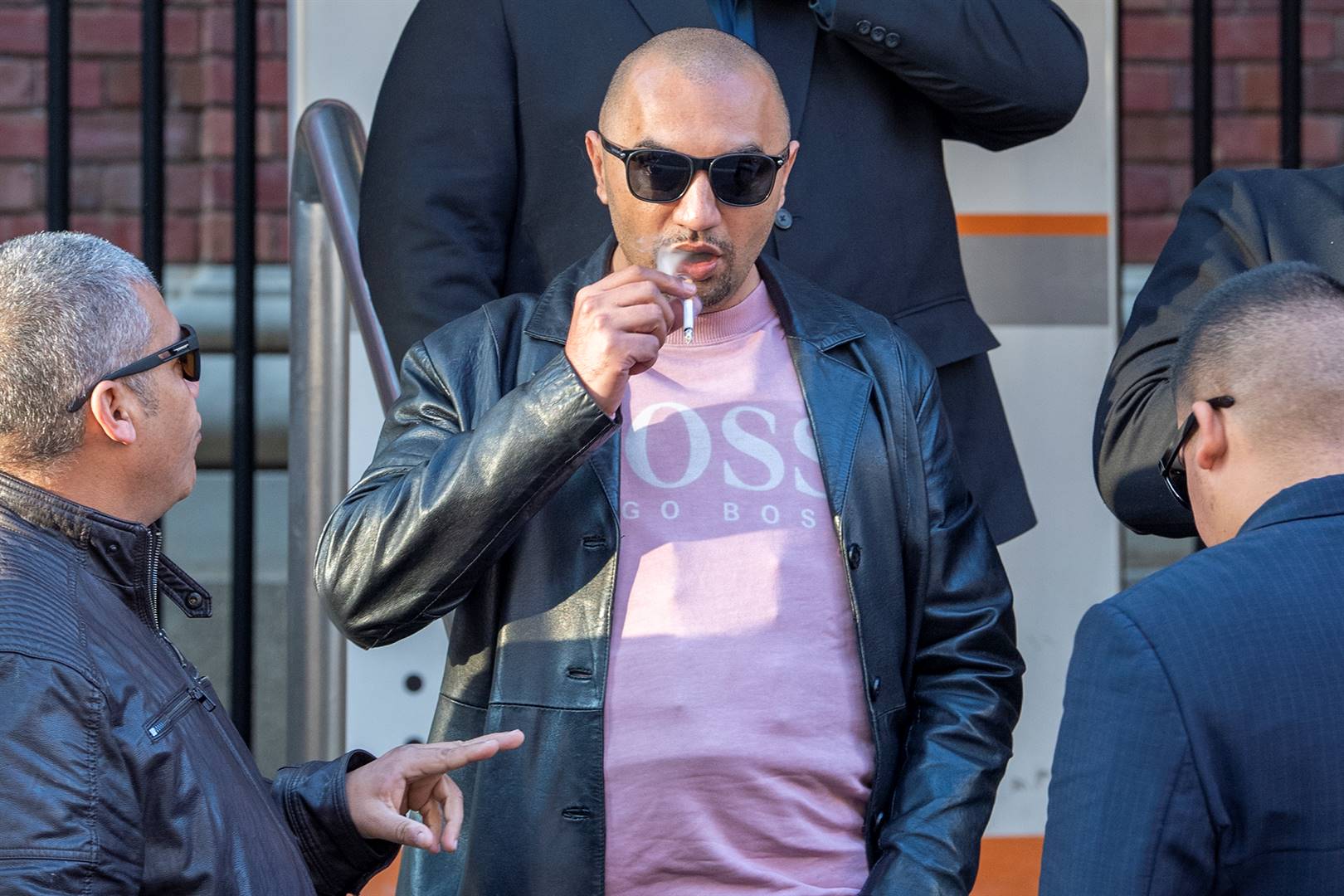- Ex-Anti-Gang Unit member Ashley Tabisher might apply for an inquiry into why he has been kept in jail for so long with no trial date in the Nafiz Modack case in sight.
- Tabisher was arrested in May 2020, and has been in custody ever since, while some of his co-accused are still finding lawyers.
- In terms of the Correctional Services Act, if someone has been a remand detainee for two years or more, with a wait of another year expected, they are entitled to question it.
Fed up with how long everything is taking before his trial starts, the former Anti-Gang Unit (AGU) member in the Nafiz Modack racketeering case intends to inquire why he should not be released, pending the eventual start of the trial.
Wearing a broad lime-green tie to make up for the levity he seems to have lost from his early days in the dock, former AGU constable Ashley Tabisher looked downcast and unhappy as he stood in the dock with his 14 co-accused.
He has tried to get bail before so he can be at home for his wife and daughter but has not succeeded.
Tabisher was brought in during the first breakthroughs into the murder of his senior, Lieutenant-Colonel Charl Kinnear, a veteran detective who specialised in investigating organised crime and illegal firearm networks.
Now, his lawyer, Bruce Hendricks, is thinking of applying for an inquiry under Section 49G of the Correctional Services Act.
READ | Anti-Gang Unit member allegedly offered R10k, cellphone by Nafiz Modack for inside info on raids
This inquiry is an option for people who have been incarcerated as a remand detainee for two years or more and their remand will exceed another year at least.
This enables the court to consider the continued detention or release under conditions appropriate to the case of the remanded detainee.
Tabisher has been in custody awaiting trial for 758 days – two years and 28 days so far – and a trial still seems far off given the preparation required for newly hired lawyers who will have to go through a 159 000-file docket, which contains thousands of charges.
At this point, not all the accused have lawyers.
Judge Nathan Erasmus presided over the pre-trial meeting in the Western Cape High Court on Friday and gave those who still did not have lawyers an ultimatum to apply for Legal Aid, even if they end up not using it.
Tabisher will go on trial with Zane Kilian, Ziyaad Poole, Moegamad Toufeek Brown, Riyaat Gesant, Fagmeed Kelly, Mario Petersen, Jacques Cronje, Petrus Visser, Janick Adonis, Amaal Jantjies, Modack’s brother, Yaseen, Mogamat Muhakadam, and Ricardo Morgan.
Besides the Kinnear murder, many are also charged with the murder of a former Hawks officer’s father, Nicolaas Heerschap, tow-truck driver Richard Joseph and Cubana Green Point bouncer Pitshou Falanga as well as the attempted murder of lawyer William Booth.
Hendricks said Tabisher wanted to know whether other police officers mentioned in the indictment have been warned in terms of possibly entering into a plea with the State.
During various iterations of the case, other police officers’ names have been mentioned in bail applications.
Pulling no punches, Tabisher also wanted a copy of the Prevention of Organised Crime certificate the State secured in December 2022, and a copy of the hand grenade attack on the late Kinnear’s house in Bishop Lavis in November 2019.
He also wants a copy of everything the police took off the phone they seized from him when he was arrested.
Tabisher used to be in the AGU, which was set up in 2018 to tackle gang crime but has since resigned.
He is alleged to have accepted an offer of R10 000 plus a free secret cellphone by Jantjies, who wanted him to give Nafiz Modack the heads up on when the AGU was going to raid his house in Plattekloof.
Jantjies met him when he was driving her partner, Adonis, to court and back on a different case.
Voice notes on these arrangements were played during Jantjies’ bail application.
Tabisher’s defence is that he was working on the orders of the retired head of the AGU, Andre Lincoln.
Erasmus said he could see as a former police officer, Tabisher would know what he would need for trial.
However, if he wanted the video or the phone transcripts, his lawyer would have to apply for further particulars, if this information is not already contained in what the State has given him.
READ | Drama as prison officials refuse to release Modack co-accused on bail despite court order
Hendricks has already tried to get Tabisher out on bail through an unconventional route.
Last year, he successfully applied for Tabisher’s urgent release on bail in terms of Section 6 (12) of the Uniform Rules of the Court.
This allows for an application to be handled differently.
It is used in urgent cases, such as preventing a child about to board a plane from being taken out of the country, and the order takes effect quickly.
Hendricks argued Tabisher’s family needed him desperately and said he was not causing delays in the case.
Now suspended Judge John Hlophe granted the application.
But Goodwood Prison authorities did not trust the order and would not let Tabisher walk out of the gates.
It was ultimately cancelled when the State pointed out it had not been able to reply to the application.
